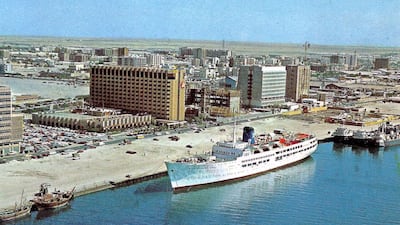What does it mean to age in Dubai? That’s the question Turkish researcher Idil Akinci explores through her work. In April, she presented photography, audio and video material in an exhibition held at Alserkal Arts Foundation. The show titled Afterlives of Retirement: A Multigenerational Archive of Aging and Migration offered a glimpse into her wider body of work, which examines how long-term residents in the UAE experience ageing and retirement.
“I focus mainly on multigenerational families, many of whom arrived in the 1970s and 1980s and have spent most of their working lives here. For them, the UAE has become home – a place where they’ve raised families, built careers and made their lives,” Akinci tells The National.
“Now that the first generation is reaching or has already reached retirement age, I’m exploring their hopes for later life: where they imagine retiring, whether they plan to stay or leave, and how they manage caregiving and changing family roles. I’m especially interested in how ideas of ‘home’ shift over time and across generations.”
'Migration is something deeply lived'
The idea of migration and home is one that Akinci knows all too well. In 2008, she moved from Turkey to Dubai, marking her first extended period of living abroad. She shared not just a flat – but even a room – in Oud Metha, near Lamcy Plaza, one of Dubai’s early landmark malls.
researcher
The mall, which has since closed and was recently sold at auction, was central to her memories of that time. Its infamous clown mascot even became the poster image for her talk, which accompanied her exhibition at Alserkal Avenue – a symbol of how deeply some places are tied to the city’s collective memory for those who grew up in the 1990s and 2000s.
She recalls the area as a place she felt “most at ease, most at home”, despite the changes the neighbourhood has gone through since. Feedback from visitors to the exhibit and her talk echoed this sentiment, that in a city evolving so rapidly, spaces tied to decades of shared memory act as anchors of nostalgia and belonging.
“Those early years in the city profoundly shaped how I understood the categories of West and East, the global North and South, and how Dubai, its residents and I myself, fit into these conversations,” says Akinci.
“Living on a tight budget, initially discovering the city mainly on foot, sharing spaces, and forming friendships that stretched across the subcontinent, the Levant, South Asia and North Africa, I came to see migration not as a bureaucratic term, but as something deeply lived, something I was actively part of.”

That personal connection soon shaped her academic path. In 2013, she began research on young adults born and raised in the UAE, many of whom were in their twenties at the time.
“Back then, I was curious about how they thought about home, belonging and the future. In short, what it meant to grow up in this context and how it shaped their life trajectories,” she says. “As I kept in touch with some of them over the years, conversations often turned to their ageing parents and the new questions that their parents’ imminent retirement brought into their lives.”
'The number of people over 65 is growing'
She soon realised there was a bigger story to tell – one that connected generations and showed how ageing, family life and emotional ties to a place are intertwined. She notes there is still not much known about how older residents in the UAE and wider Gulf experience ageing.
“Part of the reason is that these places are often seen as ‘young’ – young cities, with young and mobile populations. But that image is changing,” she says. “The number of people over 65 is slowly growing, pointing to a new reality: more residents are imagining a future where they retire and age in the UAE, not just work here for a few years or decades.”

The UAE has also played a role in this shift, with new policy changes in recent years, such as retirement visas, golden visas and long-term residency options, as well as voluntary pension schemes.
“These developments are influencing how people plan for later life – financially, emotionally and socially. And there are surveys with young residents working in the UAE that show nearly seven in 10 want to retire here, so this idea of the region being a transient space is shifting,” says Akinci.
As she has focused on this research for more than a decade, Akinci has come up with findings that might not have been previously considered. One of the most striking trends, she says, is the generational shift in how retirement and home are imagined.
“For the first generation of migrants, retirement was often about returning ‘home’, and few planned financially to retire in the UAE,” she says. “Many prioritised their children’s education or sent money abroad instead. But for younger generations born or raised here, the UAE is the only home they have ever known.”
'Questions of what it means to grow old tie us together'
Although the results are ever-evolving, Akinci says her research invites people to think differently about global migration and ageing populations – not as separate experiences but closely connected ones.
She cites the example of Europe, where ageing once meant staying in one place, while migration was associated with movement.
“It took time for the idea of migrants ageing in places of work, or taking late-life migrations after retiring in their countries of residence, to become part of public conversations and life planning,” she says. “Today, we are beginning to see a similar evolution in the UAE. Families are moving into second and third generations, with some reaching retirement age in the very place they were born or have spent most of their lives.”
Policies such as retirement visas and family sponsorship now make it easier for residents to bring ageing parents to live nearby.

“These developments are changing how life after work is imagined and experienced, as well as the demographic make-up of cities in the region,” says Akinci. “It also gives policymakers valuable insight into what shapes people’s retirement decisions – whether they choose to leave, stay or invest in a future here.”
Although Akinci now lives in Edinburgh, she remains closely connected to Dubai, a place that still feels like home. She says the exhibition felt particularly meaningful, as it’s one thing to research and write, but entirely another to see, in real time, how her work was responded to emotionally by visitors.
“Watching people linger in front of stories, photographs and reflections, seeing them nod, smile, even tear up, made me realise something simple yet profound: the questions of what it means to grow old, where life takes us after retirement, both literally and figuratively, are questions that tie all of us together, across all kinds of borders.”



